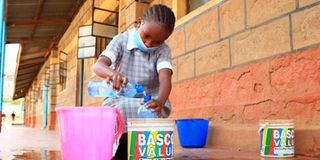On CBC, let us get it right

A Grade Four pupil do mathematics practical during the national assessment at DEB Karatina Primary School in Nyeri County on March 9, 2021.
What you need to know:
- Competencies and knowledge (content) are complementary.
- Knowledge can subsist independently; but competencies must be built upon some knowledge.
Scrutiny of the conversation around the Competency-Based Curriculum (CBC) reveals misrepresentation of facts. The most canvassed is that it aims to depart from the long-held position of knowledge-based curriculum to that of competencies.
Nothing can be farther from the truth.
Competencies and knowledge (content) are complementary. In fact, knowledge can subsist independently; but competencies must be built upon some knowledge.
The problem that CBC is trying to solve is an incomplete education process where the country focused much on theoretical knowledge and examinations, drifting away from the expected learning outcomes. The latter won’t change much.
Instructively, competencies cannot be taught in isolation; they must be grounded on concrete knowledge. For instance, communication skills partly follow proper command of language — both written and spoken — all which are based on some content.
Taking shortcuts
Here, language teachers ought to expose learners to great literature and writing skills, for example, if they wish to realise such skills. Even then, one will be expected to communicate something — which is actually knowledge-based. Similarly, a critical thinker must have an object of thought.
True, some knowledge may not have immediate application. But zeroing on skills alone is tantamount to taking shortcuts. For instance, teachers ought to impress on children the need for hygiene, responsibility and safety precautions before sending them to sweep the streets.
But moving straight to the field is fraught with untold consequences. That explains why backstreet mechanics are likely to run into problems while attempting to diagnose complex problems in motor vehicles.
It is fallacious to imagine that we can skip knowledge — a necessary condition for education — and arrive at competencies. With such, we shall be glorifying intellectual laziness.
Mr Osabwa is a lecturer at Alupe University College. [email protected]





